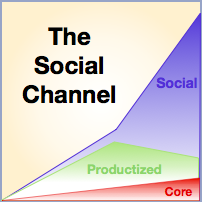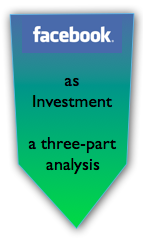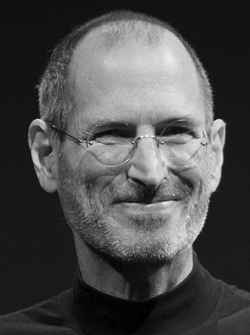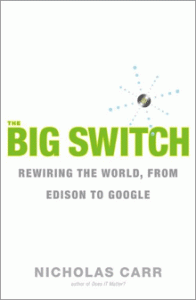 Bill Snyder at Infoworld posted some amazing statistics that support the end of social media as we know it, which I predicted in 2009. Marketing and public relations have been losing influence for years because they are impersonal, and people prefer personalized interactions (deep dive here), so marketers and their vendors are grasping at straws. In this context, “social media” has generally been practiced as a shallow promotional activity, and my premise in predicting its demise is that the true potential of social technologies is creating and maintaining relationships, which are based on personalized attention and caring. Bill Snyder at Infoworld posted some amazing statistics that support the end of social media as we know it, which I predicted in 2009. Marketing and public relations have been losing influence for years because they are impersonal, and people prefer personalized interactions (deep dive here), so marketers and their vendors are grasping at straws. In this context, “social media” has generally been practiced as a shallow promotional activity, and my premise in predicting its demise is that the true potential of social technologies is creating and maintaining relationships, which are based on personalized attention and caring.
[…]
Social Channel Three: Using the Social Channel to Defend Native Markets and Penetrate Foreign Markets
 The global Social Channel will reintroduce “home court advantage” to national brands because those that use social business to compete globally by collaborating with users will have the cultural advantage; “foreign” firms may have better product features for the money, but they will not match home brands’ cultural fluency. Personalized service and attention are culturally specific, and deep cultural fluency directly correlates to intimacy. However, brands can only develop the home court advantage by practicing social business at an advanced level. Most have a long way to go and, meanwhile, they will get hammered when they persist in competing on product features in the Productized Channel of Value. The global Social Channel will reintroduce “home court advantage” to national brands because those that use social business to compete globally by collaborating with users will have the cultural advantage; “foreign” firms may have better product features for the money, but they will not match home brands’ cultural fluency. Personalized service and attention are culturally specific, and deep cultural fluency directly correlates to intimacy. However, brands can only develop the home court advantage by practicing social business at an advanced level. Most have a long way to go and, meanwhile, they will get hammered when they persist in competing on product features in the Productized Channel of Value.
The blade cuts both ways: the home court advantage will make exporting to emerging markets much more difficult in the years ahead. The Social Channel will raise the bar because users in all markets will increasingly expect brands to relate to them and to solicit their input and advice. Brands will have to invest significantly in developing in-market social […]
Social Channel Two: Understanding the Social Channel of Value by Examining Its Precedents
 Meet the Social Channel of Value, the new arena where brands compete for user (customer, client) attention and loyalty. Product features are losing their ability to differentiate because they are copied so easily. Moreover, the Social Channel of Value will transform human decision-making, organizations and institutions because it digitizes sociality, a core human trait, and its power will dwarf the power of the product and the brand. CEOs, CMOs and CPOs have a very rare social business opportunity to harness the Social Channel ahead of competitors and remake their markets. These are strong statements, but bear with me and I think you’ll appreciate why I’ve made them. Meet the Social Channel of Value, the new arena where brands compete for user (customer, client) attention and loyalty. Product features are losing their ability to differentiate because they are copied so easily. Moreover, the Social Channel of Value will transform human decision-making, organizations and institutions because it digitizes sociality, a core human trait, and its power will dwarf the power of the product and the brand. CEOs, CMOs and CPOs have a very rare social business opportunity to harness the Social Channel ahead of competitors and remake their markets. These are strong statements, but bear with me and I think you’ll appreciate why I’ve made them.
The Social Channel is the Knowledge Economy‘s analog to the Industrial Economy’s assembly line, which led to today’s brands and mass-produced products. Where the assembly line made fabrication ten times more efficient, digital social technologies will boost human communication and sociality by an order of magnitude. The “Social Channel of Value” shows how product and service features will […]
Social Channel One: Building Post-Product Relationships with Customers is how to Build Brands
 Pioneering brands are building post-product customer relationships in the social channel because they realize that product features are copied easily and serve as weak differentiators, which leads to pervasive commoditization. Moreover, people’s preferences for individualized information dealt mass media a lethal blow, and products firms will have a similar fate. Here’s why products will become extinct and how to guide your brand in building post-product customer relationships and profits. Pioneering brands are building post-product customer relationships in the social channel because they realize that product features are copied easily and serve as weak differentiators, which leads to pervasive commoditization. Moreover, people’s preferences for individualized information dealt mass media a lethal blow, and products firms will have a similar fate. Here’s why products will become extinct and how to guide your brand in building post-product customer relationships and profits.
I have predicted for years that mass customization would be the fate of “products,” and social business is bearing this out in spades, so here I’ll delve into how impersonal “products” will be rejected by customers in 5-15 years. More important, CMOs and brand stewards who appreciate this transformation will enjoy unusual advantage, and smart ones will prepare for it now. Brands that don’t get it will simply perish, and no one will even notice except their producers and vendors. Just think about the local papers and TV stations you have known.
This is Part One […]
Upgrading the Expert Role for the Knowledge Economy shows how knowledge workers can no longer seek refuge in their core expertise, and how to branch out.

“Experts” are regarded as the foremost authorities in their fields, the glib guru versions notwithstanding. An oft quoted maxim shows why: according to Malcolm Gladwell, for one, it takes 10,000 hours [of study, work] for most people to become expert in something.* On a related front, Naveen Jain posits that experts will be less likely to solve today’s toughest problems because their expertise has become a box around them. All those degrees or promotions within the organization have focused their minds but also closed out creativity. While commenting on his post, I realized that redefining the expert would be necessary in the Knowledge Economy, so here I’ll offer some strategies and tactics for how to practice being an “expert” in the 21st century.
Notably, we can take lessons from experts and apply them to specialists, which are arguably less far along on the same vector—and more common.
[…]
 The power of specialization in social networks explains how most executives and knowledge workers are not yet in synch with the emerging Knowledge Economy and its disruption of career assumptions. One of the most powerful career beliefs of the 20th century is especially out of place in the 21st century: generalists are more flexible and employable. Read on for a brief explanation of key Knowledge Economy career trends and specific action steps you can take to expand opportunity for yourself, your colleagues and your family. The power of specialization in social networks explains how most executives and knowledge workers are not yet in synch with the emerging Knowledge Economy and its disruption of career assumptions. One of the most powerful career beliefs of the 20th century is especially out of place in the 21st century: generalists are more flexible and employable. Read on for a brief explanation of key Knowledge Economy career trends and specific action steps you can take to expand opportunity for yourself, your colleagues and your family.
[…]
 Facebook As Investment: No Replacement for Facebook But Pureplays Will Fade shows how the fading importance of social networks is the threat—not competitors. In Part One of the Facebook As Investment trilogy, I argued that Facebook had a signifiant trust gap with users that would inhibit its ability to monetize its most unique and valuable assets, and that the trust gap was recently compounded by its “IPO irregularities.” In Part Two, I’ll take a different tack and analyze the investment prospects of Facebook-the-platform. Part Three advises executives on how to isolate their social business investments from Facebook business risks. Facebook As Investment: No Replacement for Facebook But Pureplays Will Fade shows how the fading importance of social networks is the threat—not competitors. In Part One of the Facebook As Investment trilogy, I argued that Facebook had a signifiant trust gap with users that would inhibit its ability to monetize its most unique and valuable assets, and that the trust gap was recently compounded by its “IPO irregularities.” In Part Two, I’ll take a different tack and analyze the investment prospects of Facebook-the-platform. Part Three advises executives on how to isolate their social business investments from Facebook business risks.
In its favor, Facebook will not have to worry about being “displaced” by another social network the way that it displaced MySpace. In the near term, this lack of competition will give the company some breathing room. However, a more daunting threat awaits, the end of the social network pureplay, but that is 3-5 years out.
Nonetheless, the fate of pureplays should be top-of-mind for serious Facebook investors: to produce the fabulous returns that […]
Steve Jobs Tribute: Behind the Fierce Competitor and Exacting Boss, the ardent desire to serve connected the creator, the visionary and the executive.
 Much has been written about Steve Jobs the creator, the technology visionary and the enterprise leader, but none of these personas entirely get to his essence. Steve Jobs was all these things, par excellence, but what deeply touched and inspired Apple’s customers and what made Steve bearable as a boss was an unconscious yet poignant feeling that he was there to serve people. He flew the flag of The Rest of Us. Unswervingly. Vehemently. Much has been written about Steve Jobs the creator, the technology visionary and the enterprise leader, but none of these personas entirely get to his essence. Steve Jobs was all these things, par excellence, but what deeply touched and inspired Apple’s customers and what made Steve bearable as a boss was an unconscious yet poignant feeling that he was there to serve people. He flew the flag of The Rest of Us. Unswervingly. Vehemently.
Without this higher calling, Steve would have been merely a successful tyrant. However, Steve’s commitment compelled thousands of brilliant and highly intelligent people to work for him and millions of customers to feel that Apple stood for something rare. Beige boxes and senseless software are optimized for profit, but Steve loathed mediocrity and its inherent compromises because they didn’t serve people, they acted at the expense of people. The desire to serve drove Steve Jobs, the creator, the leader and the innovator. Steve would […]
Understanding Web 3.0 as Data: Reid Hoffman, Founder LinkedIn summarizes business opportunities and privacy threats of the emerging sea of social data as well as outlining Web 3.0 key concepts and importance.
 In addition to being the founder of LinkedIn, Reid Hoffman is a Valley insider with rich insight into technology trends, markets and building companies. His main message in this talk at South by Southwest 2011 was that the future was bearing down on us, and he prophesied that it would “arrive sooner and be stranger than we think.” In addition to being the founder of LinkedIn, Reid Hoffman is a Valley insider with rich insight into technology trends, markets and building companies. His main message in this talk at South by Southwest 2011 was that the future was bearing down on us, and he prophesied that it would “arrive sooner and be stranger than we think.”
He painted the context for his theme, “Web 3.0 as data,” with a simple timeline: […]
Curmudgeonly Looking into the Past to Divine the Future—That Nagging Privacy Issue—Debunking the Elephant
 The Big Switch is a valuable book that reflects what has become Nick Carr’s trademark role, heckling IT and Web enthusiasts, albeit from good seats. Carr seems to relish his role as “the fly in the ointment” of the idealistic IT-enabled world that Web missionaries espouse. Although this book has shortcomings, I recommend it for two reasons. First, Carr makes a convincing and useful argument that the “electrification” of business and society (the Edison part) has valuable lessons for the “computerization” transformation of business and society (the Google part) that is currently unfolding. This parallel provides context to think about some of the disruptions around your business, society and career. Second, Carr raises serious questions about possible privacy implications of computerization. He palpably weighs in on the dark side and seems to want the world to change course from the “googlization of life.” If you haven’t read The Long Tail, I would read these books in proximity because they are very complementary and both quick, important reads. The Big Switch is a valuable book that reflects what has become Nick Carr’s trademark role, heckling IT and Web enthusiasts, albeit from good seats. Carr seems to relish his role as “the fly in the ointment” of the idealistic IT-enabled world that Web missionaries espouse. Although this book has shortcomings, I recommend it for two reasons. First, Carr makes a convincing and useful argument that the “electrification” of business and society (the Edison part) has valuable lessons for the “computerization” transformation of business and society (the Google part) that is currently unfolding. This parallel provides context to think about some of the disruptions around your business, society and career. Second, Carr raises serious questions about possible privacy implications of computerization. He palpably weighs in on the dark side and seems to want the world to change course from the “googlization of life.” If you haven’t read The Long Tail, I would read these books in proximity because they are very complementary and both quick, important reads.
As […]
|
|
 Bill Snyder at Infoworld posted some amazing statistics that support the end of social media as we know it, which I predicted in 2009. Marketing and public relations have been losing influence for years because they are impersonal, and people prefer personalized interactions (deep dive here), so marketers and their vendors are grasping at straws. In this context, “social media” has generally been practiced as a shallow promotional activity, and my premise in predicting its demise is that the true potential of social technologies is creating and maintaining relationships, which are based on personalized attention and caring.
Bill Snyder at Infoworld posted some amazing statistics that support the end of social media as we know it, which I predicted in 2009. Marketing and public relations have been losing influence for years because they are impersonal, and people prefer personalized interactions (deep dive here), so marketers and their vendors are grasping at straws. In this context, “social media” has generally been practiced as a shallow promotional activity, and my premise in predicting its demise is that the true potential of social technologies is creating and maintaining relationships, which are based on personalized attention and caring. 
 The global Social Channel will reintroduce “home court advantage” to national brands because those that use social business to compete globally by collaborating with users will have the cultural advantage; “foreign” firms may have better product features for the money, but they will not match home brands’ cultural fluency. Personalized service and attention are culturally specific, and deep cultural fluency directly correlates to intimacy. However, brands can only develop the home court advantage by practicing social business at an advanced level. Most have a long way to go and, meanwhile, they will get hammered when they persist in competing on product features in the Productized Channel of Value.
The global Social Channel will reintroduce “home court advantage” to national brands because those that use social business to compete globally by collaborating with users will have the cultural advantage; “foreign” firms may have better product features for the money, but they will not match home brands’ cultural fluency. Personalized service and attention are culturally specific, and deep cultural fluency directly correlates to intimacy. However, brands can only develop the home court advantage by practicing social business at an advanced level. Most have a long way to go and, meanwhile, they will get hammered when they persist in competing on product features in the Productized Channel of Value.
 The power of specialization in social networks explains how most executives and knowledge workers are not yet in synch with the emerging Knowledge Economy and its disruption of career assumptions. One of the most powerful career beliefs of the 20th century is especially out of place in the 21st century: generalists are more flexible and employable. Read on for a brief explanation of key Knowledge Economy career trends and specific action steps you can take to expand opportunity for yourself, your colleagues and your family.
The power of specialization in social networks explains how most executives and knowledge workers are not yet in synch with the emerging Knowledge Economy and its disruption of career assumptions. One of the most powerful career beliefs of the 20th century is especially out of place in the 21st century: generalists are more flexible and employable. Read on for a brief explanation of key Knowledge Economy career trends and specific action steps you can take to expand opportunity for yourself, your colleagues and your family. Facebook As Investment: No Replacement for Facebook But Pureplays Will Fade shows how the fading importance of social networks is the threat—not competitors. In Part One of the Facebook As Investment trilogy, I argued that Facebook had a signifiant trust gap with users that would inhibit its ability to monetize its most unique and valuable assets, and that the trust gap was recently compounded by its “IPO irregularities.” In Part Two, I’ll take a different tack and analyze the investment prospects of Facebook-the-platform. Part Three advises executives on how to isolate their social business investments from Facebook business risks.
Facebook As Investment: No Replacement for Facebook But Pureplays Will Fade shows how the fading importance of social networks is the threat—not competitors. In Part One of the Facebook As Investment trilogy, I argued that Facebook had a signifiant trust gap with users that would inhibit its ability to monetize its most unique and valuable assets, and that the trust gap was recently compounded by its “IPO irregularities.” In Part Two, I’ll take a different tack and analyze the investment prospects of Facebook-the-platform. Part Three advises executives on how to isolate their social business investments from Facebook business risks. Much has been written about Steve Jobs the creator, the technology visionary and the enterprise leader, but none of these personas entirely get to his essence. Steve Jobs was all these things, par excellence, but what deeply touched and inspired Apple’s customers and what made Steve bearable as a boss was an unconscious yet poignant feeling that he was there to serve people. He flew the flag of The Rest of Us. Unswervingly. Vehemently.
Much has been written about Steve Jobs the creator, the technology visionary and the enterprise leader, but none of these personas entirely get to his essence. Steve Jobs was all these things, par excellence, but what deeply touched and inspired Apple’s customers and what made Steve bearable as a boss was an unconscious yet poignant feeling that he was there to serve people. He flew the flag of The Rest of Us. Unswervingly. Vehemently. In addition to being the founder of LinkedIn, Reid Hoffman is a Valley insider with rich insight into technology trends, markets and building companies. His main message in this talk at South by Southwest 2011 was that the future was bearing down on us, and he prophesied that it would “arrive sooner and be stranger than we think.”
In addition to being the founder of LinkedIn, Reid Hoffman is a Valley insider with rich insight into technology trends, markets and building companies. His main message in this talk at South by Southwest 2011 was that the future was bearing down on us, and he prophesied that it would “arrive sooner and be stranger than we think.” The Big Switch is a valuable book that reflects what has become Nick Carr’s trademark role, heckling IT and Web enthusiasts, albeit from good seats. Carr seems to relish his role as “the fly in the ointment” of the idealistic IT-enabled world that Web missionaries espouse. Although this book has shortcomings, I recommend it for two reasons. First, Carr makes a convincing and useful argument that the “electrification” of business and society (the Edison part) has valuable lessons for the “computerization” transformation of business and society (the Google part) that is currently unfolding. This parallel provides context to think about some of the disruptions around your business, society and career. Second, Carr raises serious questions about possible privacy implications of computerization. He palpably weighs in on the dark side and seems to want the world to change course from the “googlization of life.” If you haven’t read The Long Tail, I would read these books in proximity because they are very complementary and both quick, important reads.
The Big Switch is a valuable book that reflects what has become Nick Carr’s trademark role, heckling IT and Web enthusiasts, albeit from good seats. Carr seems to relish his role as “the fly in the ointment” of the idealistic IT-enabled world that Web missionaries espouse. Although this book has shortcomings, I recommend it for two reasons. First, Carr makes a convincing and useful argument that the “electrification” of business and society (the Edison part) has valuable lessons for the “computerization” transformation of business and society (the Google part) that is currently unfolding. This parallel provides context to think about some of the disruptions around your business, society and career. Second, Carr raises serious questions about possible privacy implications of computerization. He palpably weighs in on the dark side and seems to want the world to change course from the “googlization of life.” If you haven’t read The Long Tail, I would read these books in proximity because they are very complementary and both quick, important reads.